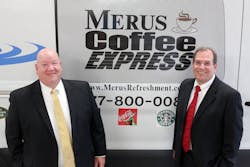Steve Bailey and Steve Gilcrease manage Merus Refreshment Services with a passion for customers. You need only look around to see the customer centric nature of their operation. Over the threshold of every door of the 10,000 square foot facility in Greenville, SC, whether it’s a closet, bathroom or warehouse entrance, there is a customer service slogan. “And that is the case for every office we have,” said Bailey, the CEO. Right outside his office is a huge banner that reads, “Customers are our future.” It’s not just lip service for Bailey and Gilcrease, the latter being company president as well as co-owner. Putting the customer first drives Merus to succeed against the challenges of being an independent office coffee service operator in a mature industry with many national competitors. They reinforce the message to staff through regular training, and customers through marketing that doesn’t just showcase the products, but also the level of service.
Making a splash in offices
Bailey and Gilcrease began in 1998 as dealers for what is now Waterlogic point of use (POU) water coolers. Business boomed, but the pair soon realized it was going to be hard to continue growing without more reoccurring sales revenue. The POU systems were averaging $49 per month. Bailey drew on his experience a decade earlier working for Tom Williams of Coffee Butler in Virginia. Since coffee tastes better with filtered water and is a service paid for by the location, much like water coolers, offering office coffee seemed like a natural product fit which the duo could offer to Greenville businesses. Bailey and Gilcrease opened the OCS division in late 1999 and it now represents 70 percent of the company’s overall revenues. Gilcrease runs the service side of the business along with facilities management, while Bailey handles the sales side.
Together, Bailey and Gilcrease compete against the larger companies by specializing in OCS. They feel that offering coffee service as an individual business provides a higher level of service. As a specialty business versus an OCS division, the customer receives more innovative coffee service solutions.
Coffee's evolution
Merus offers a variety of coffee service options, much of it centered around traditional OCS such as glass pots and air pots. They provide coffee primarily to offices, but also to foodservice. Single-cup is another strong OCS area for the company. Merus has been a Keurig authorized distributor for 8 years, leading single-cup offerings in the Greenville, Columbia and Charlotte markets. While single-cup is exciting for the consumer, Bailey has some reservations.
“K-cups® get customers focused on a specific product,” said Bailey. This eventually leads to the conversation that K-cups are available nearly anywhere and are often less expensive than what the OCS operator charges. Bailey’s team then has to remind clients that this will always be the case. “From your OCS provider, you’re getting service. Not just a variety of K-cups,” he gave as an example.
Bailey also has concerns about the quality coming from some single-cup coffee options. “I’m afraid we’re doing what we did in the mid 1980s and alienating an entire generation of coffee drinkers,” explained Bailey who was there when coffee frac pack weights were dropping in response to high green coffee prices. Weaker coffee turned many people away from coffee.
Despite some qualms, Bailey credits single-cup for overcoming price sensitivity. “We used to really work hard to convince customers paying 10 cents a cup that for 20 cents, they could get a really nice cup of coffee,” he said. “Now, with single-cup, they will pay 60 cents a cup at the drop of a hat.”
Bean-to-cup brewers have become more desired by customers, which has turned out to be a good thing. “Every bean-to-cup brewer we put out seems to generate good revenue,” he said.
Merus uses primarily Krea Necta bean-to-cup brewers. Part of the benefit is the various soluble options and the flexibility in coffee beans. “It’s an open platform,” said Bailey, “so we can put whichever solubles and beans in that the location wants.” Bean-to-cup machines aren’t for every location however. “You market them differently,” said Bailey. “We’re highly selective of the bean-to-cup customers because it requires a special relationship.” Merus needs someone willing to have a person onsite, a key operator, who will clean the brewer and do daily maintenance on the equipment such as filling the coffee bean hopper. “We certainly see the potential, but the growth is slow, as the equipment is expensive and costly to maintain,” added Bailey.
Merus has recently launched a cold brew solution. “We offer it as a 4-ounce filterpack,” said Bailey. It is coffee designed to be cold brewed and with an order, the company includes the 64 ounce pitcher to brew the coffee in for 16 to 20 hours. “I personally love cold brew and this product, not being a canned or bottled product. However, it’s been a slow mover for us,” admitted Bailey.
In addition to coffee, Merus offers paper products and bulk snacks. This has grown out of what it calls concierge service where customers can call and order a product from the Merus catalog. “We will deliver the order with the next scheduled service,” said Bailey. It’s offered to all customers because that is important to Merus’ customer-centric focus. Even with service issues, Bailey and Gilcrease have a strict service-quality rule. “If an order or service call comes in before noon, it must be dealt with that day. If afternoon, by noon the next day,” explained Bailey. “Service is the linchpin in our industry.”
One way Merus guarantees a higher degree of service is using CMAP. “We identify our larger customers under the Coffee Major Account Program or CMAP,” said Bailey. “We visit those customers on a regular basis to ensure we are handling their needs.”
Bailey and Gilcrease are constantly training their staff on service. For their six outside sales people, they will set up a full day of training and cover a wide range of topics from documentation to corporate reminders that set the right tone. However, route sales people, the ones that make deliveries, require a different training model altogether. “Route sales people have a ‘I need to get back to my route’ mentality,” said Bailey. Merus likes this attitude, so works with the dedication of its employees. Instead of scheduling long training sessions, it holds shorter, 2-hour training sessions monthly. The topics are generally internally developed and run as modules. A recent example Bailey shared was ‘Understanding The Customers Perspective,’ focused on making sure drivers hear what the customer actually means, which is not always what they say. Another example training was ‘Properly Rotating Inventory and Maintaining Equipment.’ “This is something we do over and over because it’s so important,” said Bailey.
Merus regularly communicates with decision makers and influencers via email as well. “Customers appreciate knowing about our new items,” said Bailey. Especially when it goes along with superior basic service. “We make sure we’re brilliant at the basics too — changing pots, rotating inventory, policing the area around the brewing equipment during a service, etc.” said Bailey. “Not every OCS provider does that.” And of course part of the training is to tell the decision maker or influencer about the service that just occurred in order to ensure the customer understands the quality and benefit an OCS provider offers. “An extremely high level of service is critical in this business,” added Bailey.
POU in the black
Water was the backbone of the company and still generates nearly $1 million in sales each year. “The water business is still very good,” said Bailey. Initially the POU systems Merus installed were replacing 5-gallon water coolers as it can save a customer of a certain size substantial money. For example, an account with 20 employees would likely use 10 bottles a month, which is about $65 a month in water costs, plus a $10 rental fee. A point of use system costs the location about $49 a month cutting the price substantially while still offering enhanced water.
While the company is still replacing many 5-gallon systems, there has been a substantial increase in locations that had no previous water solution. “The demand for enhanced water systems is especially large. There is definitely a consumer need and demand in the marketplace,” Bailey said. One of the reasons POU is growing so much is the shorter term contracts and pricing structure. According to Bailey and Gilcrease, when POU first came out, the leasing contracts were for 4 to 5 years. Now there is more flexibility with 12-month contracts. “Plus, the price point of POU coming down helped a lot,” added Bailey.
A business with challenges
Merus currently has no plans to extend to vending or micro markets and the reason is simple. The founders think it is important that office coffee service be its own company. “I worry about OCS being simply a division of a vending company. It won’t get the innovation it deserves,” explained Bailey.
Bailey and Gilcrease are keenly away of the market challenges. Many of their large locations are in multiple states and talk about switching to a national company in order to streamline services and get a single invoice. “There’s not much we can do,” said Bailey, “except focus on our service and educating them on our level of care.” The focus on local has helped Merus as well as the company’s training on how to talk with customers about service. “If you don’t leave tracks, it’s easy for them to think you never came,” Bailey added.
It’s this story of service to customers, supported by a dedication to providing OCS at the highest levels and regular employee training, which keeps Merus successful and ready for the future.
Operation Profile: Merus Refreshment Services, Inc.
Owners: Steve Bailey & Steve Gilcrease
Headquarters: Greenville, SC
No of employees: 25
OCS Routes: 6
Equipment: Krea Necta, Keurig, Waterlogic, Curtis
Annual revenue: not revealed
Employee Incentive Program
At Merus Refreshment Services, Inc. success is a team effort. That is why co-owners Steve Bailey and Steve Gilcrease offer an annual trip to employees and their spouses for meeting or exceeding revenue and business goals. The annual incentive trip is extended to all employees, and their spouses, and offered at two different times. Half the staff goes on the first trip, and the rest go on the second trip. This past year was a cruise and for 2017, it is the Amelia Islands in Florida.
Regular Training & Communication
Merus Refreshment Services, Inc. requires monthly training of its route drivers, called route sales people. One of the common themes is listening to the customers. Topics may include how to change the culture from being driven by what is easiest for the company or driver, which is the tendency, to what is better for the customer. Another is how to report on what was just accomplished during a service call or regular delivery, such as rotated pots or cleaning the area. “You have to continuously point out to your customers the type of service you’re providing,” explained Steve Bailey, CEO and co-owner, “we call it leaving tracks.” Without being educated on the quality of service, OCS can become an invisible benefit that is overlooked unless there is a problem. By “leaving tracks” Merus ensures the service is recognized and the location understands the company’s commitment to the customer.
About the Author

Emily Refermat
Emily Refermat began covering the vending industry in 2006 and served as editor of Automatic Merchandiser from 2012 to 2019. To reach the current editor of Automatic Merchandiser and VendingMarketWatch.com, email [email protected].
